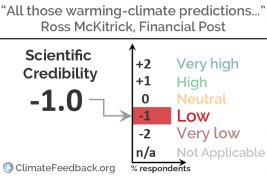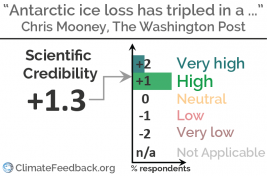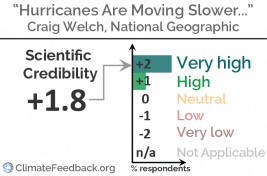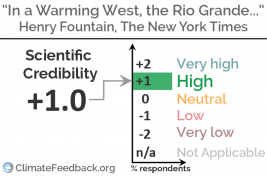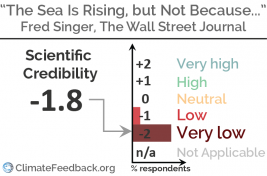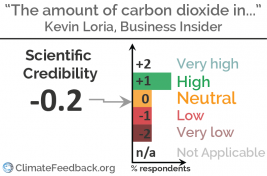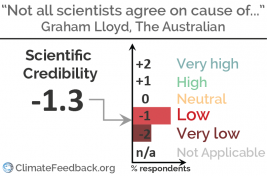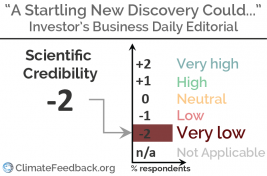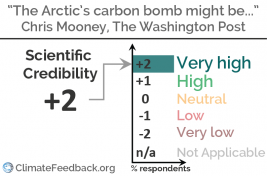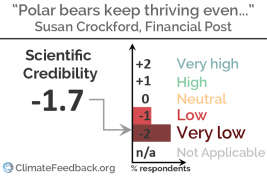Article Reviews
“Is this article consistent with the latest thinking and knowledge in science?”
“Would experts in this field endorse the main message of this article?”
These are the types of questions our “feedbacks” are designed to answer. If the feedback is positive, you can generally assume the information you’re reading is of high credibility. If it’s negative, however, you may want to read with extra care and attention — some of the information contained and conclusions reached are not consistent with science.[1]
Financial Post commentary misleads about warming effect of greenhouse gas emissions by cherry-picking studies
in Financial Post, by Ross McKitrick
"This article selectively cherry-picks studies showing low climate sensitivity, leaving out whole lines of evidence (e.g. paleoclimate studies) that agree with the sensitivity estimates found in models. It also glosses over the many criticisms of instrumentally based (or “energy balance”) sensitivity estimates published in recent years."
— 22 Jun 2018
Washington Post article accurately describes latest estimate of accelerating Antarctic ice loss
in The Washington Post, by Chris Mooney
"The article presents the results of the study accurately, and uses multiple comments from scientists both involved and not-involved in the study to highlight the key findings. Some of the explanations are simplified, and there is a slight attempt at the end to downplay the results by suggesting scientists can’t predict the future. It is correct that the study presented is not making predictions, rather documenting past changes, but the positive trend is what we would expect based on the longer record of change we have for glaciers and ice caps."
— 15 Jun 2018
National Geographic accurately covers research pointing to slower-moving hurricanes
in National Geographic, by Craig Welch
"This is an important topic and the article explains the new research findings clearly... Highlighting how this result about slowing storms is consistent across two studies that employ very different methodologies further helps convey to the public how we try to use multiple lines of evidence to understand how our world works and how it may chance in the future."
— 08 Jun 2018
New York Times story accurately describes Rio Grande’s climate context
in The New York Times, by Henry Fountain
"The issue of water resource management in the western US and how it fits within a changing climate is extremely complex and spans many disciplines from climatology to hydrology to city planning to population dynamics, and so on. This article does a nice job presenting the very basics of the climate science involved and tying the greater changes to the personal stories of people in the region."
— 31 May 2018
Wall Street Journal commentary grossly misleads readers about science of sea level rise
in The Wall Street Journal, by Fred Singer
"The article has almost nothing to do with the modern state of sea-level science. The author tries to call into question that global warming causes sea-level rise, and does so by cherry-picking a short segment of data from 1915-1945, a time when data quality is poor and the warming signal small—a bizarre approach that could never pass scientific peer review and is apparently aimed at misleading a lay audience."
— 18 May 2018
Business Insider highlights health impacts of climate change, but some aspects are misleading
in Business Insider, by Kevin Loria
"The article draws attention to the high CO2 at present and the health risks of climate change, but it gives the incorrect impression that breathing CO2 directly is a major cause of concern. The most important health effects of climate change—heat stress, vector-borne diseases, air pollution, access to food and water, severe storms, displacement—do get some discussion here."
— 15 May 2018
The Australian’s coverage of Great Barrier Reef study creates perception that scientists are divided
in The Australian, by Graham Lloyd
"The Australian chooses to present a mixed message on this story when the science is extremely clear. The title and quote from Prof. Kaempf do not represent the views of the broader scientific community."
— 22 Apr 2018
Investor’s Business Daily editorial misrepresents study to claim plants will prevent dangerous climate change
in Investors' Business Daily, by Anonymous
"Our nitrogen study does not detract from the urgency of the climate problem, nor the unequivocal evidence of the role of carbon pollution in causing global climate change. The climate threat is clear and present and we must solve it rapidly by reducing emissions and capturing existing CO2 from the atmosphere."
— 12 Apr 2018
Washington Post accurately covers permafrost study, albeit under a somewhat sensational headline
in The Washington Post, by Chris Mooney
The article accurately described a study indicating that more of the carbon released from thawing permafrost will be released as methane and provided context on its overall implications by quoting comments from two other researchers. The article’s headline, however, may mislead readers through the use of the sensational phrase “the Arctic’s carbon bomb”, which calls to mind a catastrophic, explosive release of greenhouse gas.
— 22 Mar 2018
Financial Post publishes misleading opinion that misrepresents science of polar bears’ plight
in Financial Post, by Susan Crockford
"The article is composed of misstatements. These are either based upon the author’s apparent lack of understanding of the ecological and geophysical situations, or intent to mislead readers."
— 02 Mar 2018
[1] Note: These feedbacks do not constitute endorsements of the author’s political or economic ideology, rather they are assessments of the scientific foundations and reasoning of the argumentation contained within each article.

